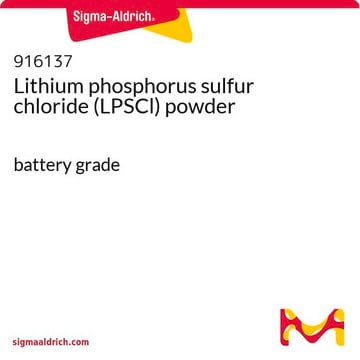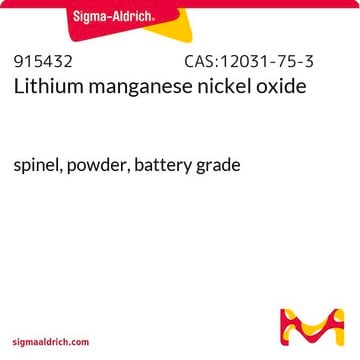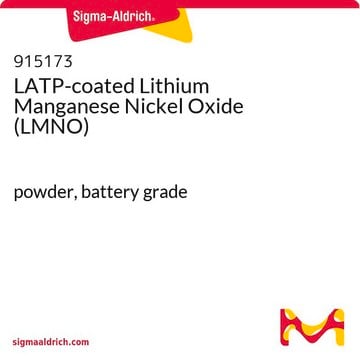760994
Lithium nickel cobalt aluminium oxide
powder, <0.5 μm particle size, >98%
Synonym(e):
NCA
About This Item
Empfohlene Produkte
Qualität
battery grade
Assay
>98%
Form
powder
Mol-Gew.
Mw 110.45 g/mol
Zusammensetzung
LiNi0.8Co0.15Al0.05O2
Grünere Alternativprodukt-Eigenschaften
Design for Energy Efficiency
Learn more about the Principles of Green Chemistry.
sustainability
Greener Alternative Product
Partikelgröße
<0.5 μm
mp (Schmelzpunkt)
>1000 °C (lit.)
Dichte
4.45 g/cm3 (lit.)
Anwendung(en)
battery manufacturing
Grünere Alternativprodukt-Kategorie
Allgemeine Beschreibung
Anwendung
Leistungsmerkmale und Vorteile
Rechtliche Hinweise
Ähnliches Produkt
Signalwort
Warning
H-Sätze
Gefahreneinstufungen
Carc. 2 - Skin Sens. 1
Lagerklassenschlüssel
13 - Non Combustible Solids
WGK
WGK 3
Flammpunkt (°F)
Not applicable
Flammpunkt (°C)
Not applicable
Analysenzertifikate (COA)
Suchen Sie nach Analysenzertifikate (COA), indem Sie die Lot-/Chargennummer des Produkts eingeben. Lot- und Chargennummern sind auf dem Produktetikett hinter den Wörtern ‘Lot’ oder ‘Batch’ (Lot oder Charge) zu finden.
Besitzen Sie dieses Produkt bereits?
In der Dokumentenbibliothek finden Sie die Dokumentation zu den Produkten, die Sie kürzlich erworben haben.
Kunden haben sich ebenfalls angesehen
Artikel
Professor Qiao's review explores stable microstructures for lithium metal fluoride batteries, advancing energy storage technologies.
Solid oxide fuel cells and electrolyzers show potential for chemical-to-electrical energy conversion, despite early development stages.
Li-ion batteries are currently the focus of numerous research efforts with applications designed to reduce carbon-based emissions and improve energy storage capabilities.
The critical technical challenges associated with the commercialization of electric vehicle batteries include cost, performance, abuse tolerance, and lifespan.
Unser Team von Wissenschaftlern verfügt über Erfahrung in allen Forschungsbereichen einschließlich Life Science, Materialwissenschaften, chemischer Synthese, Chromatographie, Analytik und vielen mehr..
Setzen Sie sich mit dem technischen Dienst in Verbindung.















